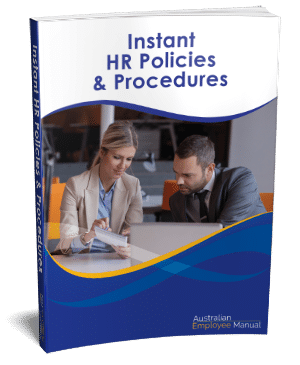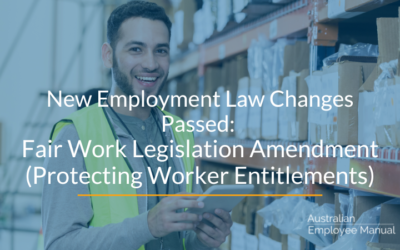This week has seen a number of awards undergo variations because of the pandemic. With most variations, additional clauses or schedules have been added to increase flexibility around the taking of leave.
Some awards have gone much further, and have included clauses around changes of duties, direction to take leave and reducing hours of work.
Industrial relations provisions are changing rapidly at this time, so remember to regularly check with the Fair Work Australia website for updates.
121 Awards Varied
Due to the impact of the Coronavirus Pandemic, the Fair Work Commission announced on the 1 April 2020 that they will be amending 103 of Australia’s 121 existing Awards to provide additional flexibility.
These new provisions will apply until 20 June 2020, but may be extended.
Pandemic Leave (Unpaid)
The amended awards will allow eligible employees up to two week’s unpaid leave if they are required to self-isolate or are otherwise prevented from working at premises operated by the employer by measures taken by the government or medical authorities during the pandemic.
Employees need to give notice of taking the leave as soon as practicable and need to give the employer evidence that will satisfy a reasonable person (e.g. a statutory declaration) that the leave if taken for that reason.
This leave is counted as service and will not affect any other paid or unpaid leave entitlements, with the leave available in full immediately rather than accruing during a year of service.
The leave will be available to all employees – full-time, part-time and casual (not pro-rated) and it is not necessary for employees to exhaust their paid leave entitlements before they access this pandemic leave.
Annual Leave at Half Pay
The Commission has dertermined to provide additional flexibility in respect of annual leave.
If the employer and employee agree, the employee can take twice as much annual leave on half the pay. Instead of an employee taking one week’s annual leave on full pay, they can take 2 week’s annual leave on half pay.
If the employee is entitled to leave loading under the award, their full pay for the two week’s leave is the same as they would have received for 1 week’s leave on full pay including the leave loading.
You need to record that you have agreed to this arrangement in writing and retain the note with the employee record.
Awards affected
- Aboriginal Community Controlled Health Services Award 2010
- Aged Care Award 2010
- Air Pilots Award 2010
- Aircraft Cabin Crew Award 2010
- Airline Operations-Ground Staff Award 2010
- Airport Employees Award 2010
- Alpine Resorts Award 2010
- Aluminium Industry Award 2020
- Ambulance and Patient Transport Industry Award 2020
- Amusement, Events and Recreation Award 2010
- Animal Care and Veterinary Services Award 2020
- Aquaculture Industry Award 2020
- Architects Award 2010
- Asphalt Industry Award 2010
- Banking, Finance and Insurance Award 2020
- Book Industry Award 2020
- Broadcasting, Recorded Entertainment and Cinemas Award 2010
- Business Equipment Award 2010
- Car Parking Award 2020
- Cement, Lime and Quarrying Award 2010
- Cemetery Industry Award 2020
- Children’s Services Award 2010
- Cleaning Services Award 2010
- Clerks -Private Sector Award 2010
- Commercial Sales Award 2010
- Concrete Products Award 2010
- Contract Call Centres Award 2010
- Corrections and Detention (Private Sector) Award 2020
- Cotton Ginning Award 2020
- Dry Cleaning and Laundry Industry Award 2010
- Educational Services (Post-Secondary Education) Award 2010
- Educational Services (Schools) General Staff Award 2010
- Educational Services (Teachers) Award 2010
- Electrical, Electronic and Communications Contracting Award 2010
- Electrical Power Industry Award 2020
- Fast Food Industry Award 2010
- Fire Fighting Industry Award 2010
- Fitness Industry Award 2010
- Food, Beverage and Tobacco Manufacturing Award 2010
- Funeral Industry Award 2010
- Gardening and Landscaping Services Award 2020
- General Retail Industry Award 2010
- Graphic Arts, Printing and Publishing Award 2010
- Hair and Beauty Industry Award 2010
- Health Professionals and Support Services Award 2010
- Higher Education Industry-Academic Staff-Award 2010
- Higher Education Industry-General Staff-Award 2010
- Horse and Greyhound Training Award 2010
- Horticulture Award 2010
- Hospitality Industry (General) Award 2010
- Journalists Published Media Award 2010
- Labour Market Assistance Industry Award 2010
- Legal Services Award 2020
- Live Performance Award 2010
- Local Government Industry Award 2010
- Mannequins and Models Award 2010
- Manufacturing and Associated Industries and Occupations Award 2010
- Marine Tourism and Charter Vessels Award 2010
- Market and Social Research Award 2020
- Meat Industry Award 2010
- Medical Practitioners Award 2020
- Miscellaneous Award 2010
- Nursery Award 2020
- Nurses Award 2010
- Passenger Vehicle Transportation Award 2010
- Pastoral Award 2010
- Pest Control Industry Award 2010
- Pharmaceutical Industry Award 2010
- Pharmacy Industry Award 2010
- Plumbing and Fire Sprinklers Award 2010
- Poultry Processing Award 2010
- Premixed Concrete Award 2020
- Professional Diving Industry (Recreational) Award 2010
- Professional Employees Award 2010
- Racing Clubs Events Award 2010
- Racing Industry Ground Maintenance Award 2020
- Rail Industry Award 2010
- Real Estate Industry Award 2020
- Registered and Licensed Clubs Award 2010
- Restaurant Industry Award 2010
- Road Transport (Long Distance Operations) Award 2010
- Road Transport and Distribution Award 2010
- Salt Industry Award 2010
- Seafood Processing Award 2020
- Security Services Industry Award 2010
- Silviculture Award 2020
- Social, Community, Home Care and Disability Services Industry Award 2010
- Sporting Organisations Award 2020
- State Government Agencies Award 2020
- Storage Services and Wholesale Award 2010
Restaurant Award
On 31 March, the Restaurant Award was varied by the additional of a temporary schedule to provide additional flexibility during the pandemic in relation to:
- the range of duties employees can be required to perform;
- reduction of ordinary hours of work for full-time and part-time employees; and
- employees being directed to take annual leave, and employees by agreement taking twice the amount of annual leave at half pay.
Basically, while this schedule is in force, employers can direct employees to do other tasks that they have the skill, qualifications and licences to safely do, even if that is not normally within their usual work. (e.g. to take on a barista role).
There are still higher duties pay requirements if the employee works at a higher classification, but it they perform tasks below their classification they need to be paid their usual pay rate.
Employers can now also reduce their permanent employees’ hours of work after discussing the changes with their employee to an average of:
- between 22.8 and 38 ordinary hours each week for full time employees
- between 60% and 100% of the guaranteed hours per week or over the roster cycle for part-time employees.
The thing to remember is that employees working these reduced hours continue to accumulate and take their paid leave based on their ordinary hours before the employer reduced the hours.
In addition, employers under the Restaurant Award can now direct employees to take annual leave provided they give at least 24 hours notice and take the employee’s personal situation into account.
If the business has to close down for a period, employers can direct all employees to take annual leave by giving them at least 1 week’s notice (or shorter notice if that is agreed). If the employee doesn’t have enough accrued leave to cover the close down, the employer can direct them to take unpaid leave. This unpaid leave counts as service for entitlements under the Restaurant Award and the National Employment Standards.
Clerks Award
On 28 March, the Clerks Award was varied by the additional of a temporary schedule to provide additional flexibility during the pandemic in relation to:
- employees’ classifications and duties
- minimum engagement/pay for part-time and casual employees
- span of hours changes while working at home
- full-time and part-time employees’ hours of work
- directions to take annual leave.
Basically, while this schedule is in force, employers can direct employees to do other tasks that they have the skill, qualifications and licences to safely do, even if that is not normally within their usual work.
There are still higher duties pay requirements if the employee works at a higher classification, but it they perform tasks below their classification they need to be paid their usual pay rate.
Part-time employees who have agreed with their employer to work from home can have their minimum engagement reduced from 3 hours per shift to 2 hours per shift.
Casual employees who have agreed with their employer to work from home must be paid for a minimum of 2 hours’ work per shift (rather than 3).
Span of hours changes while working at home
Employees who have agreed with their employer to work from home can make an agreement with their employer to change their span of hours to allow them to work between:
- 6am and 11pm, Monday to Friday
- 7am and 12.30pm, Saturday.
Employers don’t need to agree with a majority of their employees to make these changes.
Day workers won’t be considered shiftworkers for entitlements under the Clerks Award while these arrangements are in place.
Hours of work for full-time and part-time employees
Employers can temporarily reduce their permanent employees’ hours of work to not less than 75% of their full-time ordinary hours or agreed part-time hours immediately prior to the reduction. This can be for the whole business or a section of the business.
If an employer wants to reduce their employees’ hours, the employees will need to vote in favour of the reduction of hours. At least 75% of the full-time and part-time employees in the business or section of the business must approve the temporary reduction.
There are rules around what constitutes a valid vote that employers need to comply with.
Any employee who has had their hours reduced can ask their employer for permission to:
- find more work with another employer
- access training, professional development and study leave through their employer.
An employer can’t unreasonably refuse an employee’s request for find other work. An employer must also consider all reasonable requests for training, professional development or study leave.
Employees working reduced hours under the Schedule will continue to accumulate their paid leave and termination of employment entitlements based on their ordinary hours of work before the reduced the hours started.
Annual leave and close down of business
Employers can direct an employee to take annual leave the Schedule by giving their employees at least 1 week’s notice (or any shorter period of notice that is agreed).
If the annual leave is because the business is closing down for a period due to coronavirus and an employee doesn’t have enough paid annual leave to cover the whole period, the employer can direct them to take unpaid leave. The period of unpaid leave counts as service for entitlements under the Clerks Award and National Employment Standards.
If the business isn’t closing, the employer can only direct an employee to take annual leave if the:
- employee still has at least 2 weeks of leave left after the direction
- employer considers the employee’s personal situation.
Employees can take up to twice as much annual leave at a proportionally reduced rate if their employer agrees.
Employees and employers can still agree to take annual leave at any time.
Hospitality Award
On 24 March, the Hospitality Award was varied by the additional of a temporary schedule to provide additional flexibility during the pandemic in relation to:
- the range of duties employees can be required to perform;
- reduction of ordinary hours of work for full-time and part-time employees; and
- employees being directed to take annual leave, and employees by agreement taking twice the amount of annual leave at half pay.
Basically, while this schedule is in force, employers can direct employees to do other tasks that they have the skill, qualifications and licences to safely do, even if that is not normally within their usual work. (e.g. to deliver food to people at home).
There are still higher duties pay requirements if the employee works at a higher classification, but it they perform tasks below their classification they need to be paid their usual pay rate.
Employers can now also reduce their permanent employees’ hours of work after discussing the changes with their employee to an average of:
- between 22.8 and 38 ordinary hours each week for full time employees
- between 60% and 100% of the guaranteed hours per week or over the roster cycle for part-time employees.
The thing to remember is that employees working these reduced hours continue to accumulate and take their paid leave based on their ordinary hours before the employer reduced the hours.
In addition, employers under the Hospitality Award can now direct employees to take annual leave provided they give at least 24 hours notice and take the employee’s personal situation into account.




